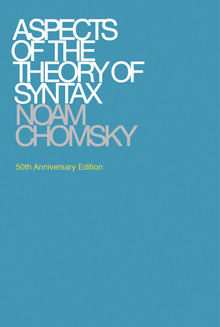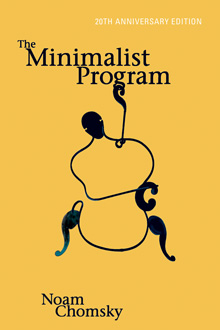One of the best-known passages Noam Chomsky has written about linguistics appeared 50 years ago, asserting that humans have intrinsic capabilities allowing them to use language from an early age—an idea he had been developing for years, and which remains strongly associated with him.

It cannot be the case that “all knowledge derives solely from the senses,” Chomsky wrote in the book Aspects of the Theory of Syntax, published in 1965. Indeed, he continued, “there is surely no reason today for taking seriously a position that attributes a complex human achievement entirely to months (or at most years) of experience, rather than to million of years of evolution or to principles of neural organization,” among other factors.
This is the “poverty of stimulus” idea: children cannot acquire their linguistic capabilities entirely from external sources because there is simply not enough information available.
Still active at 86, Chomsky has written a new preface for a 50th-anniversary edition of Aspects of the Theory of Syntax, as well as for a 20th-anniversary edition of another central book, 1995’s The Minimalist Program. And he remains happy to defend such long-held views.
“It’s not an argument—it’s a truism,” he says, speaking in his Stata Center office. He adds: “It’s a truism for every aspect of growth and development. It doesn’t have a name in other domains [besides linguistics] because it’s taken for granted.”
As Chomsky notes in the preface to Aspects, however, his work has faced challenges since the mid-1990s, in the form of new hypotheses and studies about child learning. In his view, none of them demolish the “poverty of stimulus” idea; for instance, one 2005 study about child learning, he has asserted, was rebutted in 2008 by linguist Xuân-Nga Cao Kam and other colleagues, who concluded that the results were an artifact of the study’s format. And in the new preface, Chomsky asserts that the “old and important” concept of “structure dependence”—our ability to discern grammatical relationships among words regardless of their distance from each other—remains a powerful piece of evidence for his idea.

In The Minimalist Program, Chomsky sought to streamline our understanding of the core properties language exhibits as an efficient cognitive and expressive system. Leaving aside the challenges to his work, linguistics has seen “a huge explosion of empirical work” over the last half-century, he notes, “and by now the range of language that is studied is beyond anything that was ever contemplated.” Searching for deeper, unifying principles, he adds, “essentially is the minimalist program.”
Chomsky keeps conducting new linguistic research; lately he has been working with colleagues on the deep evolutionary origins of human language. We’ll check back in another 20 or 50 years to see how well that research has held up, too.
Recent Books From the MIT Community
The Power of Resilience: How the Best Companies Manage the Unexpected
By Yossi Sheffi, PhD ’77, professor of engineering systems and director of the MIT Center for Transportation and Logistics
MIT Press, 2015, $29.95
Anigrafs: Experiments in Cooperative Cognitive Architecture
By Whitman Richards, professor emeritus, Department of Brain and Cognitive Sciences
MIT Press, 2015, $25
New Frontiers in Open Innovation
Edited by Joel West ’79, Henry Chesbrough, and Wim Vanhaverbeke
Oxford University Press, 2015, $90
Productivity and Reuse in Language: A Theory of Linguistic Computation and Storage
By Timothy J. O’Donnell, postdoctoral fellow, Department of Brain and Cognitive Sciences
MIT Press, 2015, $45
MIT Building 20: Short Stories
By Bradford Howland, PhD ’87
Xlibris, 2014, $24.99
Proof Patterns
By Mark Joshi, PhD ’94
Springer, 2015, $49.99
An Observer’s Guide to Clouds and Weather: A Northeastern Primer on Prediction
By Toby Carlson ’58, SM ’60, Paul Knight, and Celia Wyckoff
American Meteorological Society, 2015, $30
Our Mathematical Universe: My Quest for the Ultimate Nature of Reality
By Max Tegmark, professor of physics
Vintage, 2015 $16.95
Please submit titles of books and papers published in 2014 and 2015 to be considered for this column.
Contact MIT News
E-mail: mitnews@technologyreview.com
Write: MIT News, One Main Street,13th Floor, Cambridge, MA 02142
Keep Reading
Most Popular
Large language models can do jaw-dropping things. But nobody knows exactly why.
And that's a problem. Figuring it out is one of the biggest scientific puzzles of our time and a crucial step towards controlling more powerful future models.
How scientists traced a mysterious covid case back to six toilets
When wastewater surveillance turns into a hunt for a single infected individual, the ethics get tricky.
The problem with plug-in hybrids? Their drivers.
Plug-in hybrids are often sold as a transition to EVs, but new data from Europe shows we’re still underestimating the emissions they produce.
Stay connected
Get the latest updates from
MIT Technology Review
Discover special offers, top stories, upcoming events, and more.